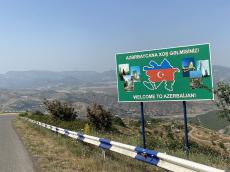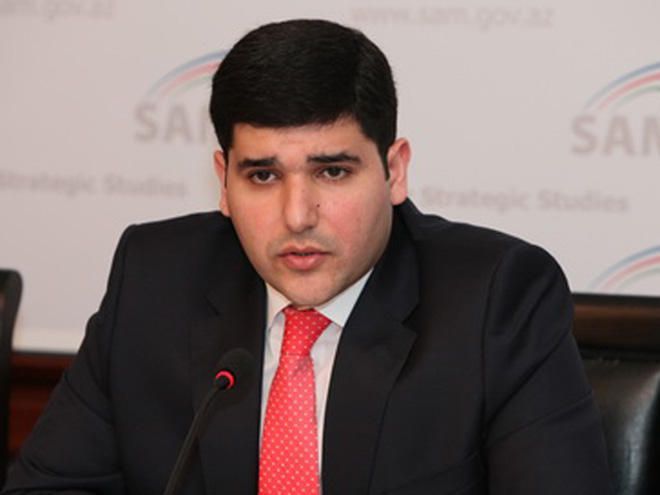|
|
TODAY.AZ / Politics
West may hinder demarcation process as Armenia-occupied 8 villages on agenda [COMMENTARY]
14 January 2024 [09:00] - TODAY.AZ
 By Azernews
By AzernewsInformative and lengthy interview of Azerbaijani President Ilham Aliyev emphasises his desire to achieve peace in the South Caucasus. Reaction of jealousy and panic travelled in a wave through the information field of Armenian society, which has long been in the hands of manipulators of the separatist clan.
During an interview with local media journalists, the President of Azerbaijan touched upon the issue of the eight occupied villages by Armenia and their return to Azerbaijan, where he also said that the next meeting of the commissions on delimitation of the borders of the Gazakh-Tovuz region is scheduled for January 2024.
"This issue is also being discussed during my contacts with the Armenian Prime Minister, including during the conversation "on the feet" in St. Petersburg I raised this issue. It is also on the agenda of the Delimitation Commission. I must also say that the next meeting of the Delimitation Commission is scheduled for this month and there will be one topic: the issue of delimitation of this region, the Gazakh-Tovuz region," said Azerbaijani President Ilham Aliyev during the interview.
Peace treaty process between Armenia and Azerbaijan depends on the will and desire of these sides to achieve it, excluding use of violence and manipulation against each other. However, there are some "forces" in Armenia that stick to decisions from the position of fear and personal gain and push others to revanchist ideas.
"Each side approaches the peace treaty from different positions, where the Armenian one is to create maximum security guarantees for itself. In the three years since the end of the Second Garabagh War, one of Armenia's objectives has been to leave the issue of the Armenians of Garabagh in limbo."

Political analyst Farhad Mammadov, in his comment to Azernews about the mentioned issue, noted that currently Armenia does not see a separate option in realizing the peace treaty, especially since it attaches importance to the opening of borders with its western neighbour, Turkiye. According to him, Armenia does not even address the issue of Garabagh Armenians in the terms of the peace agreement.
"The main provision of the peace agreement is the issue of security. On the other hand, Armenia considers the restoration of relations with neighbouring Turkiye a priority for itself. Therefore, the signing of a peace agreement between Azerbaijan and Armenia is inevitable," the expert emphasized.
The expert also says that he is hopeful that a peace treaty between Armenia and Azerbaijan will lead to a certain level of stability, where the normalisation of relations and its transition to cooperation is expected to take a long period of time.
"With the Turkish side in the very near future, Armenian relations will also lead to co-operation and its interactions. I think that this is the main position of Armenia. Azerbaijan's proposal not to burden the peace treaty with difficult to resolve issues of unblocking communications or defining some principles and framework of the delimitation and demarcation commission, this proposal of Azerbaijan should be accepted in principle," F. Mammadov added.
The political analyst points out that peace is actually not that far from reach. However, the forces preventing this, especially the revanchist groups existing in the West, are constantly trying to push Armenia out of its line. For example, despite the fact that one of the principles of the peace agreement is the opening of the Zangazur corridor, the Armenian side shows mysterious hesitation on this issue. However, the territory of Zangazur was historically open and, like the territory of Azerbaijan, it was a land connecting Nakhchivan and Eastern Zangazur.
Even Azerbaijani President said, recalling that in 1918 the city of Yerevan, after the Sovietisation of Zangazur, was transferred to Armenia, and during the Soviet years this process continued, and the last land transfer was carried out in May 1969. That's why some forces in Armenia and its patrons want to use the 1970s maps as a basis for determining borders.
According to expert Farhad Mammadov, Armenians are just trying to turn the invalid decisions of the former Soviet Union into a flag in their hands.
"As for the borders, there is some fetishisation of the 1975 maps. Or you see, the Armenians deny this and say that there were no certain borders from 1975 to 1989. In other words, they reject the idea that borders exist by expressing refuting opinions," he said.
The Azerbaijani political analyst also touched on the issue of the return of enclaves belonging to Azerbaijan remaining in the Armenian territories in the direction of Gazakh and Tovuz within the framework of border delimitation and demarcation. Recall that. During his interview with local television, President Ilham Aliyev emphasized that he will return to this issue next month.
However, another obstacle in the middle is the influence of the West on Armenia. Given the fact that Western European countries are getting closer and closer to Armenia, where France is an example, there is a probability that Armenia will try to protract process of delimitation of Gazakh-Tovuz region with Azerbaijan in January.
Farhad Mammadov added in conclusion that the decision within the framework of the commission on delimitation is first of all a political decision.
"Because if we look at this particular section (of the Gazakh-Tovuz region) there are enclaves, i.e., 8 occupied villages by Armenia. This can be the beginning of decision-making on this region, it can also be the laying of the foundation for this process.
As for the West, well, if the West "sincerely" wants to help Armenia, ensure its security, supply weapons and show 200 European men and women running around with binoculars is the most they can do, it is better to agree with Azerbaijan, and quickly carry out the process of delimitation and demarcation," the expert concluded.
URL: http://www.today.az/news/politics/243637.html
 Print version
Print version
Connect with us. Get latest news and updates.
See Also
- 23 November 2024 [14:00]
You all made a mistake, Pashinyan is not a taxi driver, but a trader! - 23 November 2024 [13:36]
Azerbaijan's peace initiatives: their importance is priceless - 23 November 2024 [10:41]
Vardanyan's family confused the Prosecutor General with Santa Claus - 22 November 2024 [17:05]
Renowned dancer Farid Kazakov joins jury of Istanbul Autumn Festival - 22 November 2024 [17:05]
Azerbaijan created favorable conditions for lasting peace, stability and reliable security in S. Caucasus - President Ilham Aliyev - 22 November 2024 [16:59]
US climate experts brainstorm on multiple issues causing natural phenomena - 22 November 2024 [16:48]
Leyla Aliyeva attends panel discussion on "Protection of Leopards in Changing Climate Conditions" held within COP29 - 22 November 2024 [15:56]
Crushing blow from Baku by Frank Pallone - 22 November 2024 [12:50]
Armenians promise to get Woodrow Wilson's ideas out of the coffin - 21 November 2024 [22:04]
Macron's visit to Chile ends with failure
Most Popular
 Armenians promise to get Woodrow Wilson's ideas out of the coffin
Armenians promise to get Woodrow Wilson's ideas out of the coffin
 Macron's visit to Chile ends with failure
Macron's visit to Chile ends with failure
 Sad clowns in the arena: the old repertoire of Azerbaijan's detractors
Sad clowns in the arena: the old repertoire of Azerbaijan's detractors
 Azerbaijan leading way in decarbonized transport, says ADB Official
Azerbaijan leading way in decarbonized transport, says ADB Official
 Russian House in Baku to host evening in honor of Alfred Schnittke
Russian House in Baku to host evening in honor of Alfred Schnittke
 Are Pashinyan's deputies recovering?
Are Pashinyan's deputies recovering?
 Rare Christian artifact from the 5th century AD has been found in Turkiye
Rare Christian artifact from the 5th century AD has been found in Turkiye
